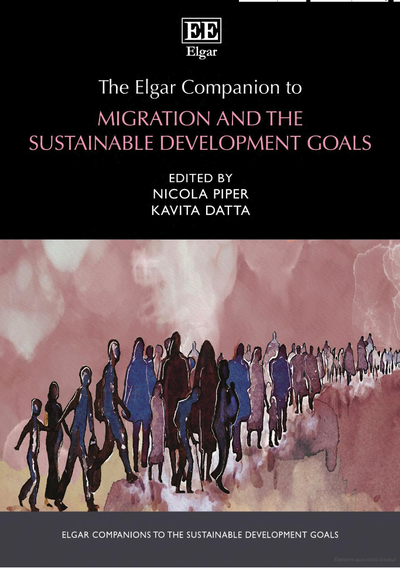25 Apr 2024
Books/ Book Chapters
Panizzon, Marion
Of patterns, processes and priorities: what the Global Compact for Migration Means by ‘aligning’ partnerships to the UN Agenda 2030

Book chapter by WTI Senior Research Fellow, Marion Panizzon, together with Prof. Luzia Jurt, FHNW, in the Edward Elgar Companion to Migration and Sustainable Development (2024) edited by Nicola Piper and Kavita Datta.
This dynamic Companion explores the connections - and disconnections - between migration and sustainable development as articulated by the UN’s Agenda 2030 and Sustainable Development Goals (SDGs). Providing a critical appraisal of Agenda 2030, it examines the extent to which the SDGs encompass migration and migrant-related experiences within the context of the pledge to ‘leave no-one behind’.
Presenting intersectional approaches alongside nuanced understandings of crisis and climate change induced mobility, this Companion interrogates the complex linkages and intersections between sustainable development and contemporary migration. Chapters assess the importance of the policy and governance of migration and the SDGs across local, regional, and global scales, drawing on examples from diverse sectors, geographies, and migration corridors. The Companion provides a comprehensive analysis of the importance of inserting migration into SDG debates on a wide range of issues, including poverty and inequality, climate change and food insecurity, education, labour rights, the migrant right to vote, and diaspora finance.
This insightful Companion will prove an essential resource to postgraduate students and scholars of development studies, migration studies, human geography, education, and international relations. Its substantive focus on the core development agenda will also benefit policymakers invested in the implementation of the SDGs.
WTI Senior Research Fellow, Marion Panizzon, co-authored the chapter 22: "Of patterns, processes and priorities: what the Global Compact for Migration Means by ‘aligning’ partnerships to the UN Agenda 2030".
The companion is edited by Nicola Piper, Professor of International Migration and British Academy Global Professor Fellow, School of Law, Queen Mary University of London and Kavita Datta, Professor of Development Geography, School of Geography, Queen Mary University of London, UK.

